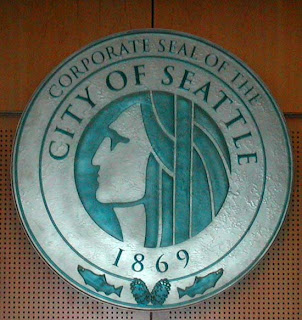Grassroots Activists Applaud Seattle Council for Passing Yellow Pages Ordinance Today
Toughest Phonebook Restrictions in the Country
SEATTLE -- Today, the Seattle City Council voted 8-1 in favor of a new ordinance which creates an enforceable opt-out system restricting unwanted delivery of yellow page phone books. In addition, the distributors of the books will pay the city a per book ($0.14 per book) and per ton fee ($148.00 per ton) to recover the costs to the city to recycle the phonebooks and set up the opt-out registry. The mayor is expected to sign the Council bill.
Council Member Mike O’Brien has been the leader of the effort, taking up the issue early on and even asking citizens to bring him their unwanted books. His office was flooded with hundreds of books, creating mountains of books that his staff had to peak around in order to speak to visitors to his office.
“This is a big step forward for citizens who are tired of getting unwanted phonebooks dropped on their doorsteps,” said Jeanette Henderson who has been one of the grassroots activists as part of Zero Waste Seattle promoting this legislation for the past year.
Seattle citizens will be able to go to a single web page to cancel either all phone book delivery, or to select the number and types of yellow page books they still want delivered. This opt-out system will be similar to the national “do not call” registry for unwanted solicitation phone calls
“We have seen an immense amount of public support for this ordinance,” says Ellie Rose of Zero Waste Seattle, “It is not every grassroots campaign where you have people lined up six deep to sign your petition!”
Heather Shute of Environment Washington highlights the savings to the city, “According to Seattle Public Utilities, the city currently pays over $350,000 per year just to handle the recycling of phone books. In addition, many people toss the books into the trash, and off they go to the landfill!"
Another feature of the ordinance is a restriction on non-recyclable attachments to phonebooks. “How many people remember to pull off those magnets when they toss their books,” asked Jolie Lemoine of Zero Waste Seattle. “Those magnets end up going to the paper mills and getting slivered up and contaminating the recycled paper. We are pleased that these will no longer be allowed.”
In addition to cost savings, grassroots activists raised issues of privacy and climate change. Scott Stromatt of the Cascade Chapter Sierra Club said, "The ordinance is a positive step forward in reducing greenhouse gas emissions in Seattle and in limiting the intrusion of unwanted phone books on our property."
Heather Trim of Zero Waste Seattle continued, “Seattle is already a leader in working to reduce our carbon footprint and advance zero waste goals. We expect that many cities across the US will be following suit quickly. Most jurisdictions are looking to save money, reduce waste, and address climate change. This ordinance is a win-win!”
“We applaud the leadership of the City Council to stand up to the pressure of the Yellow Pages lobbyists who worked hard to fight this ordinance,” said Sally Wolf of Zero Waste Seattle. “Our City Council voted to implement a simple system to let Seattleites to say “No” to unwanted phone book delivery.”
For more information about Zero Waste Seattle: zerowasteseattle.org




